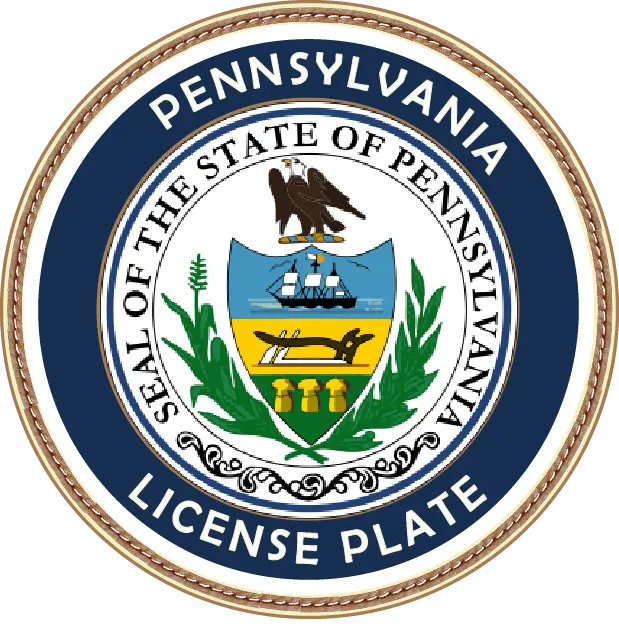Pennsylvania License Plate Search
FAQ - The Answers to Common Questions
License Plate Registration in Pennsylvania
Registering your vehicle in Pennsylvania is an essential process for all vehicle owners. It not only ensures that your vehicle is legally recognized by the state but also allows you to obtain the necessary license plates for your vehicle. This page provides a detailed overview of the license plate registration process in Pennsylvania, including requirements, steps, and useful information.
Understanding License Plate Registration
License plate registration is the process of officially recording your vehicle with the Pennsylvania Department of Transportation (PennDOT). This process assigns a unique license plate number to your vehicle, which helps in identifying it on the road. It is mandatory for all vehicles operating in Pennsylvania, whether they are newly purchased, transferred from another state, or previously registered.
Who Needs to Register?
All vehicle owners in Pennsylvania are required to register their vehicles, including:
- New Vehicle Owners: If you purchase a new or used vehicle, you must register it with PennDOT within 20 days of purchase.
- Out-of-State Transfers: If you move to Pennsylvania and bring your vehicle with you, you need to register it in Pennsylvania.
- Renewals: Existing registrations must be renewed periodically, typically every year or two, depending on the type of vehicle.
Requirements for License Plate Registration
To register your vehicle and obtain license plates in Pennsylvania, you need to provide several key documents and meet specific requirements, including:
- Proof of Identity: You must present a valid form of identification, such as a Pennsylvania driver’s license, state ID, or another government-issued ID.
- Proof of Ownership: This can include the vehicle title, bill of sale, or manufacturer’s certificate of origin (MCO) for new vehicles.
- Proof of Insurance: You must provide proof of insurance that meets Pennsylvania's minimum coverage requirements.
- Vehicle Identification Number (VIN): Your vehicle's VIN must be verified, which is typically done by PennDOT when you register.
- Payment for Fees: Registration fees vary based on the type of vehicle, the length of registration, and any additional services required.
Steps for Registering Your Vehicle
The following steps outline the process for registering your vehicle and obtaining license plates in Pennsylvania:
- Gather Required Documents: Collect all necessary documents, including your ID, proof of ownership, insurance details, and payment for registration fees.
- Visit PennDOT: You can register your vehicle in person at your local PennDOT office or through their official website. Some counties may offer online registration services.
- Complete the Application: Fill out the Vehicle Registration Application (Form MV-1) at the PennDOT office or online.
- Submit Your Documents: Provide the completed application along with your identification, proof of ownership, proof of insurance, and payment.
- Receive Your License Plates: After processing your application, PennDOT will issue your license plates, which you should attach to your vehicle immediately.
Renewing Your License Plate Registration
License plate registrations must be renewed periodically. Here’s how you can renew your registration in Pennsylvania:
- Check Your Renewal Notice: PennDOT will send you a renewal notice by mail, usually at least 45 days before your registration expires.
- Gather Necessary Documents: Collect your current registration, proof of insurance, and payment for the renewal fee.
- Submit Your Renewal: You can renew your registration online through the PennDOT website, by mail, or in person at your local office.
Failure to renew your registration on time can result in penalties or fines, so it’s important to stay on top of these deadlines.
License Plate Types in Pennsylvania
Pennsylvania offers a variety of license plates to suit different needs and preferences. Some common types include:
- Standard Plates: These are the most common plates issued for passenger vehicles, featuring a unique combination of letters and numbers.
- Specialty Plates: These plates support various causes or organizations, such as charities, military services, or schools. They may come with an additional fee.
- Vanity Plates: Personalized plates that allow you to choose your own combination of letters and numbers, subject to availability and guidelines.
- Commercial Plates: These plates are designated for vehicles used for business purposes and may have different registration requirements.
Conclusion
In conclusion, license plate registration in Pennsylvania is a crucial step for all vehicle owners. By understanding the requirements and following the proper procedures, you can ensure that your vehicle is legally registered and roadworthy. Whether you are registering a new vehicle, transferring an out-of-state plate, or renewing an existing registration, it’s essential to stay informed about the process and any updates from PennDOT. For more detailed information or specific inquiries, you can always refer to the Pennsylvania Department of Transportation website.
